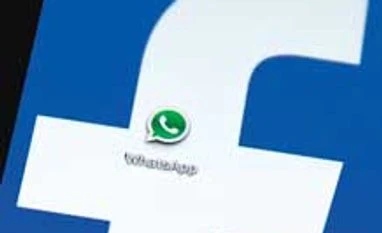There was never any doubt that Facebook's acquisition of WhatsApp - now valued at $21.8 billion - was about gaining users before profits. And still, a new regulatory filing lays bare the profound unprofitability of the messaging service for which Facebook traded a full tenth of its market value.
WhatsApp reported a meagre $10.2 million in revenue last year, according to a filing with the Securities and Exchange Commission. The money presumably came from charging some users $1 a year to use the mobile application, which lets users share text messages and images, since WhatsApp does not allow advertising
To generate that revenue, WhatsApp spent heavily across the board. Research and development at the start-up, which employed just 55 people at the time it was sold, totalled $77 million, a figure that includes some salaries. General and administrative costs amounted to $18.6 million. In total, WhatsApp spent about $149 million last year, resulting in a net loss of $138 million. That far exceeds the net loss reported in 2012, a relatively modest $55 million.
For this, Facebook offered $4 billion in cash and $12 billion in stock, with the company's founders eligible for an additional $3 billion in restricted stock. But as Facebook's own stock has continued to rise, so has the value of the deal. The final tally came in at $21.8 billion, as the Deal Professor noted this month.
Facebook can afford to spend lavishly. Since announcing its acquisition of WhatsApp, It's stock has risen 20 per cent, giving it a market value of $208 billion. Investors appear unfazed by the willingness of Mark Zuckerberg to make huge bets on money-losing companies, instead trusting Silicon Valley logic over conventional measures of corporate worth.
WhatsApp reported a meagre $10.2 million in revenue last year, according to a filing with the Securities and Exchange Commission. The money presumably came from charging some users $1 a year to use the mobile application, which lets users share text messages and images, since WhatsApp does not allow advertising
To generate that revenue, WhatsApp spent heavily across the board. Research and development at the start-up, which employed just 55 people at the time it was sold, totalled $77 million, a figure that includes some salaries. General and administrative costs amounted to $18.6 million. In total, WhatsApp spent about $149 million last year, resulting in a net loss of $138 million. That far exceeds the net loss reported in 2012, a relatively modest $55 million.
For this, Facebook offered $4 billion in cash and $12 billion in stock, with the company's founders eligible for an additional $3 billion in restricted stock. But as Facebook's own stock has continued to rise, so has the value of the deal. The final tally came in at $21.8 billion, as the Deal Professor noted this month.
Facebook can afford to spend lavishly. Since announcing its acquisition of WhatsApp, It's stock has risen 20 per cent, giving it a market value of $208 billion. Investors appear unfazed by the willingness of Mark Zuckerberg to make huge bets on money-losing companies, instead trusting Silicon Valley logic over conventional measures of corporate worth.
©2014 The New York Times News
)